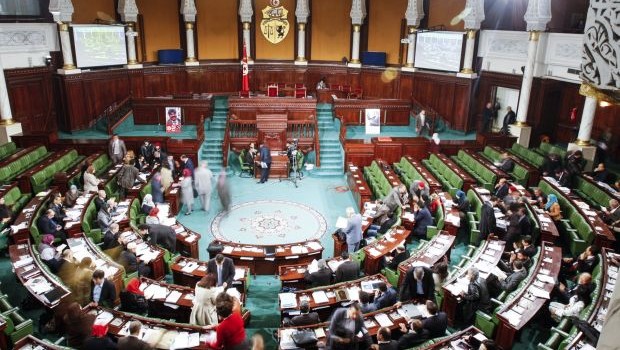
Parliament members gather, on Friday, Jan. 3, 2014 at the National assembly in Tunis. (AP Photo/Aimen Zine)
Tunis, AP—Tunisia’s assembly began to vote Friday for the new constitution that its members have spent the last two years writing, a crucial step in the North African nation’s transition to democracy.
Three years ago, Tunisians overthrew their long-ruling dictator with demands for greater freedom and more jobs. That set off a chain reaction of uprisings across the Arab world—now known as the Arab Spring revolutions—that also brought down governments in Libya, Egypt and Yemen.
With a military coup in Egypt last year and militia-fueled chaos in neighboring Libya, Tunisia’s slow and painful process of writing a new constitution appears to be the region’s best chance for a new democracy.
“We are today at the decisive hour of a long process that aims to establish a democratic state,” assembly president Mustapha Ben Jaafar said as the vote began.
The assembly’s 217 members need to approve each of the new document’s 150 articles with a simple majority vote before passing the entire document with a two-thirds majority.
The vote is expected to be completed by Jan. 14, the third anniversary of dictator Zine El Abidine Ben Ali’s overthrow and exile to Saudi Arabia. If the constitution fails in parliament, it will go before a national referendum.
The process has not been easy. It has taken place against a backdrop of a failing economy and rising terrorist attacks—including the assassinations of two opposition politicians—by groups said to be linked to Al-Qaeda in the Maghreb.
Tunisia’s moderate Islamist Ennahda Party, which holds around 40 percent of the body’s seats, had pushed for articles enshrining Islamic law and describing men and women as “complementary” rather than equal but withdrew them in the face of fierce opposition from other parties.
While the entire process was marked by repeated deadlocks, walkouts and constant wrangling, both sides ultimately showed a willingness to compromise that has been absent in neighboring countries.
“The constitution is generally good on a democratic level,” said constitutional law professor Iyadh Ben Achour. “It guarantees rights and freedoms according to international norms.”
While the members have reached a consensus on most aspects of the constitution—suggesting a good chance that it will pass—there are still differences over the balance of power between an elected president and the prime minister as well as the future role of the elected assembly.
Meanwhile, Tunisia’s political parties are negotiating the creation of a new caretaker government to run the country until elections later this year. The Islamist-led government of Prime Minister Ali Larayedh agreed to step down after the July assassination of a left-wing politician.
